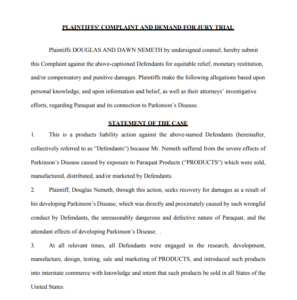With trial approaching, Syngenta settles paraquat lawsuit brought by Parkinson’s patient
Less than a month ahead of what would have been the first US trial over allegations that a popular weedkiller causes Parkinson’s disease, pesticide maker Syngenta has settled the case.
With a looming Aug. 4 trial date in Philadelphia, the case of Douglas Nemeth v. Syngenta had been closely watched as the two sides battled over evidence to be presented. The trial previously was delayed multiple times.
Nemeth, who worked as a farmer/agricultural worker for more than 20 years, is battling the debilitating and incurable brain disease after years of exposure to paraquat weedkillers made by Syngenta. He alleges that Syngenta should have warned users of the risks of Parkinson’s disease from chronic, long-term use of paraquat.
 The judge in the case noted the settlement in a docket entry on Monday, after making several rulings denying motions by Syngenta to exclude certain witnesses who planned to testify for Nemeth.
The judge in the case noted the settlement in a docket entry on Monday, after making several rulings denying motions by Syngenta to exclude certain witnesses who planned to testify for Nemeth.
It is among several cases Syngenta has settled shortly before trial dates. The amount of money Syngenta agreed to pay Nemeth is not being disclosed.
Dave Dickens, a lawyer representing Nemeth, confirmed the settlement but declined to comment further.
Nemeth is among more than 6,000 people suffering from Parkinson’s who have sued Syngenta in the United States. The lawsuits all make similar allegations, claiming the company engaged in a scheme to suppress knowledge about the chronic risks of paraquat exposure.
Two more cases are set for trial in Philadelphia – one in October and one in January. But observers, who did not want to be quoted, said they expect Syngenta to settle or otherwise attempt to keep every case from going to trial due to evidence that includes damning internal documents that show the company was aware of research connecting paraquat to Parkinson’s disease decades ago.
The New Lede, in conjunction with The Guardian, obtained and revealed many of those internal files, and maintains a library of some of the documents.
Not only was Syngenta aware of research linking paraquat to Parkinson’s but it also sought to secretly influence scientific information and public opinion regarding those links, internal corporate documents show.
Syngenta has always maintained that the evidence linking paraquat to Parkinson’s disease is “fragmentary” and “inconclusive.” But numerous scientific studies have found that paraquat damages cells in the brain in ways that can lead to Parkinson’s.
Separate from the settlement in Philadelphia, Syngenta is pursuing a global settlement to try to put an end to the litigation. The terms have not been publicly disclosed, but some plaintiffs’ lawyers involved in the litigation have complained that the proposed settlement amounts per case are too paltry to accept, while others are supporting the settlement.
As the litigation winds on, many plaintiffs are dying before they can get a chance to go to trial or to settle.
Last month, lawyer Curtis Hoke pleaded with a California judge to allow his client, 73-year-old Richard Clasen, to go ahead with his planned trial against Syngenta. Clasen was one of four plaintiffs who had been selected for bellwether trials in proceedings overseen by the California judge, but only one of two who were still alive in early June.
Clasen, who was suffering from Parkinson’s-related dementia and other health problems, has now also died.
Parkinson’s is an incurable, progressive disorder that affects nerve cells in the brain, leading in advanced cases to severe physical debilitation and often dementia. Many Parkinson’s experts say the disease can be caused by a range of factors, including exposure to pesticides such as paraquat, as well as other chemicals.
Paraquat was introduced in the 1960s by a predecessor to Syngenta, which is based in Switzerland but is a Chinese-owned entity. Paraquat is commonly used by farmers to control weeds before planting their crops and to dry out crops for harvest. In the United States, the chemical is used in orchards, wheat fields, pastures where livestock graze, cotton fields and elsewhere.




